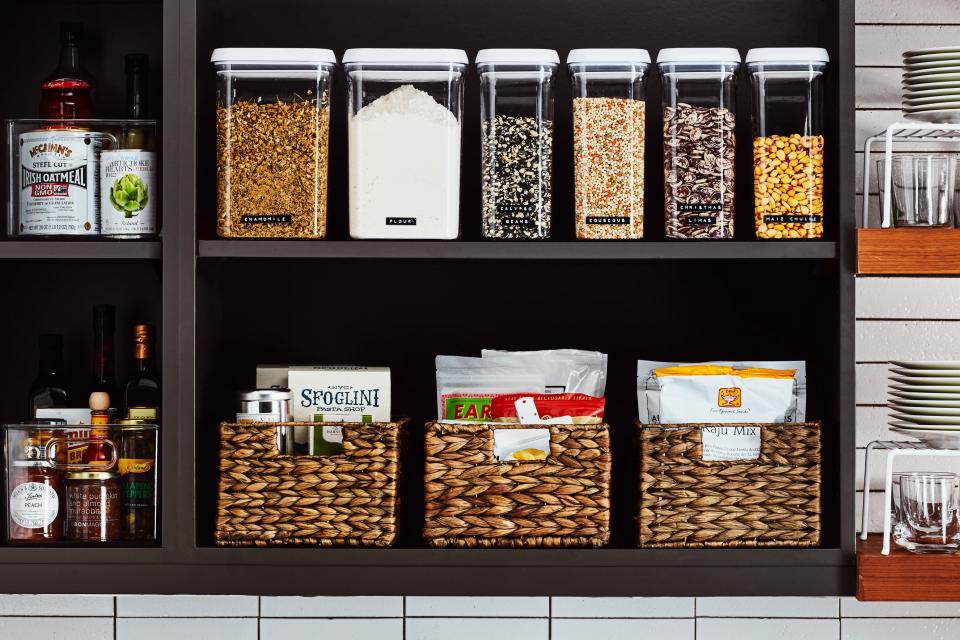How Low-Waste Cooking Has Made Me Happier
Last year, when my family started working to reduce our household waste and set up a more environmentally friendly kitchen routine, I expected we’d reap some tangible benefits—like healthier, home-cooked meals, some small savings (thanks to fewer impulse purchases), and less bickering over whose turn it was to haul out the trash. Plus, of course, the knowledge we were doing some small part to help stave off impending climate doom. But now, a year on, I have to admit that one of the primary reasons I intend to keep at it is unabashedly selfish: “low-waste” living has made happier.
Call it a serendipitous side-effect: just when I'd finally accepted that I'll never be the type of person who does morning pages and listens to wellness podcasts, making small changes in the name of low-waste living has managed to sneak mindfulness into my life. You know, sort of the way you sneak a golden retriever's medication into a piece of deli cheese.
I'm pretty sure it started with yogurt. When I switched from tossing plastic tubs of Fage into my cart every week to making fresh yogurt in the Instant Pot, it forced me to slow down and focus. Making yogurt isn't hard—there's almost nothing to it—but the one thing is does take is time. You have to remember to start the culture a day ahead and build in time on the other end to let the yogurt cool. And as I settled into this new normal, it dawned on me—completely accidentally—that I was suddenly feeling a lot more present in my kitchen life, more connected to the food I was making and the people that I was making it for.
It’s not that the chaos was gone, but there was certainly less of it. And later, as I added more elements to our family's low-waste routine—making a loaf of sandwich bread on Sunday instead of using plastic-packaged bread for school lunches, swinging by the farmers market to stock up on meat and veggies on Wednesdays and Saturday—that feeling only multiplied. I’m no Pollyanna—there are still plenty of hectic days when cooking and shopping feels like a chore—but most of the time I find myself leaning into the work, and feeling grateful for the way these little tasks give my week a comforting rhythm.

Living this way has also been a powerful reminder of how the simple act of making things can make you feel good. Silly little stuff—like mending moth-eaten sweaters and keeping alive a small container garden of greens and herbs—has activated parts of my brain that had been dormant for decades. It has also reminded me that sometimes—despite what my aspirational Instagram feed suggests—expertise can be seriously overrated. Trust me: you don’t need to be a genius with a needle to make a reusable produce bag out of an old pillowcase. So what if the stitching is a little wonky? You’ll still get a jolt of joy every time you use it.
Also, even if you’re just conquering small challenges, over time, the realization that you might be more capable than you thought creeps into other parts of your life in unexpected ways. Consider this: a few months ago, my husband and I had a small plumbing emergency when a pipe cracked and exploded under our sink. Ordinarily, I would have been on the phone with a plumber before my husband was done mopping the puddle—but this time, we paused a moment. How complicated could it be to fix? Before we forked over $500 of our hard earned cash, wasn’t it at least worth attempting to do it ourselves? So—with the help of three YouTube videos, two trips to the plumbing supply store, and only a modest amount of cursing—I’m proud to say we did. And I am 1000% certain that would not have happened a year ago.

The Best Tools for Organizing Your Family's Pantry
I’ve also learned—against all my maximalist impulses—that it’s possible to enjoy some willful simplicity now and then. Before my family started this project, I’d heard of the concept of “decision fatigue” or what popular psychologist Barry Schwartz calls “choice overload”—namely, that the more choices we have, the more stressed and less satisfied we tend to become. But I’d never really looked at the way those stressors might be playing out in my own life.
Schwartz writes that “before [so many] options were available, a buyer...had to settle for an imperfect fit, but at least [the purchase] was a five-minute affair. Now it is a complex decision in which [you’re] forced to invest time, energy, and no small amount of self-doubt, anxiety, and dread.” He’s talking about buying jeans—but when I first read his words, it wasn’t hard to see the parallels to the pantry and the produce aisle. And indeed, once I started giving myself fewer food choices, by prioritizing using up scraps and cooking from my pantry before buying anything more, I was surprised to find that the boundaries felt liberating rather than constricting, and made my cooking—and my outlook in general—at once looser and more creative.
Are these good vibes permanent? Only time will tell. All I know is that that the inadvertent mindfulness of low waste living has done more to help me trust myself and embrace the motto of “good enough” than any meditation retreat or self-help guru I’ve found. And that’s good enough for now.
Originally Appeared on Epicurious

